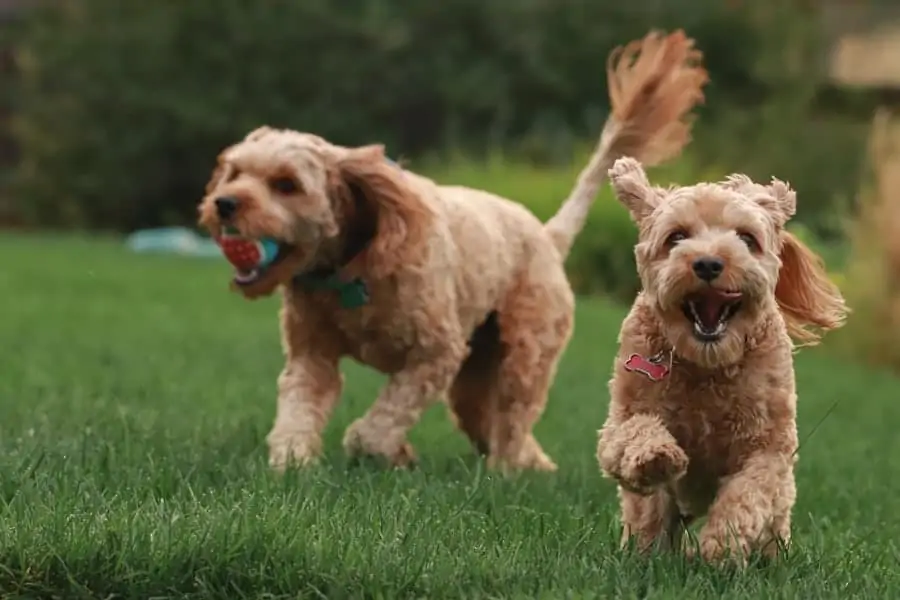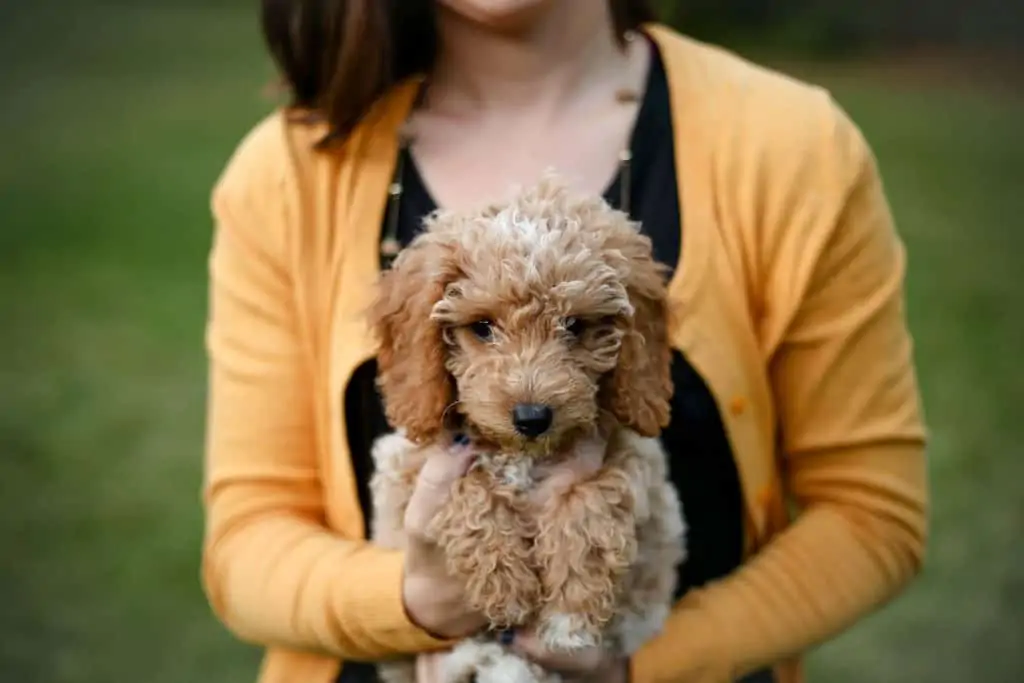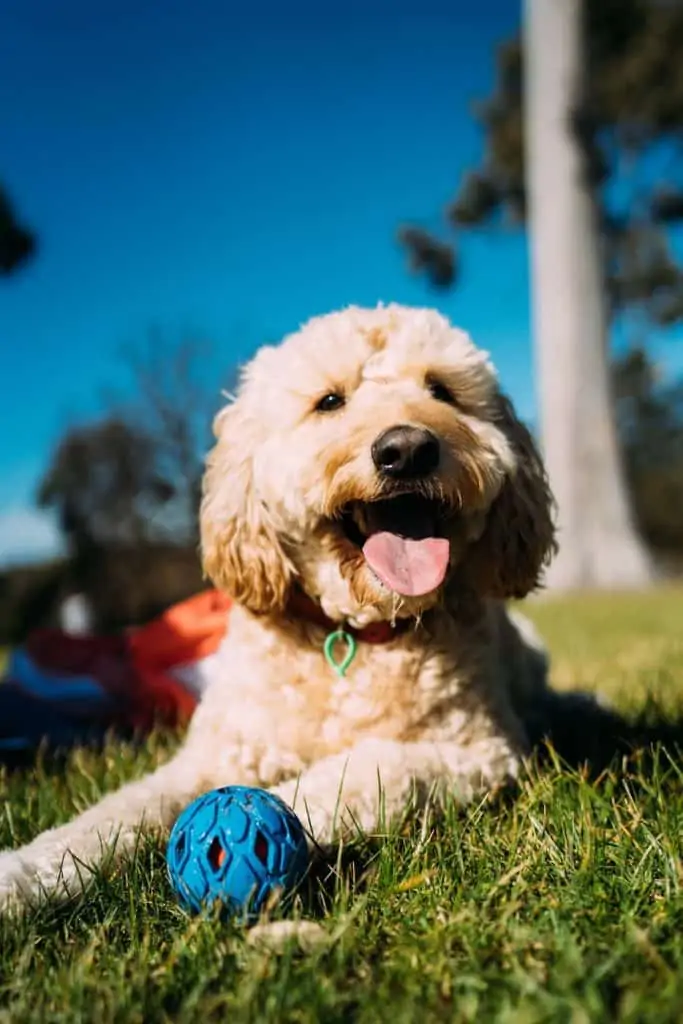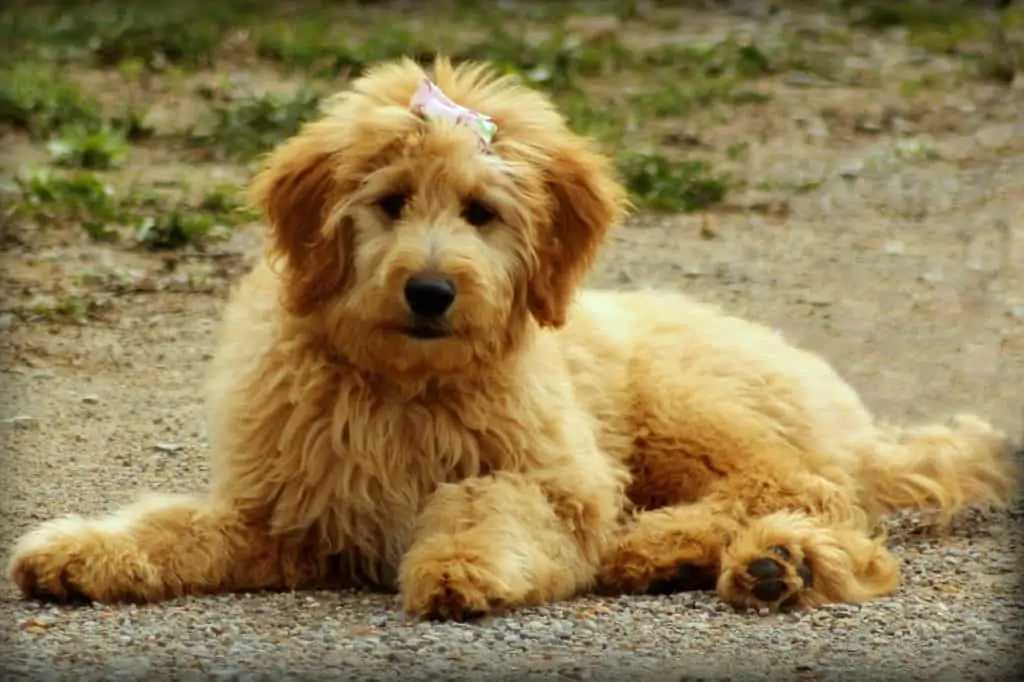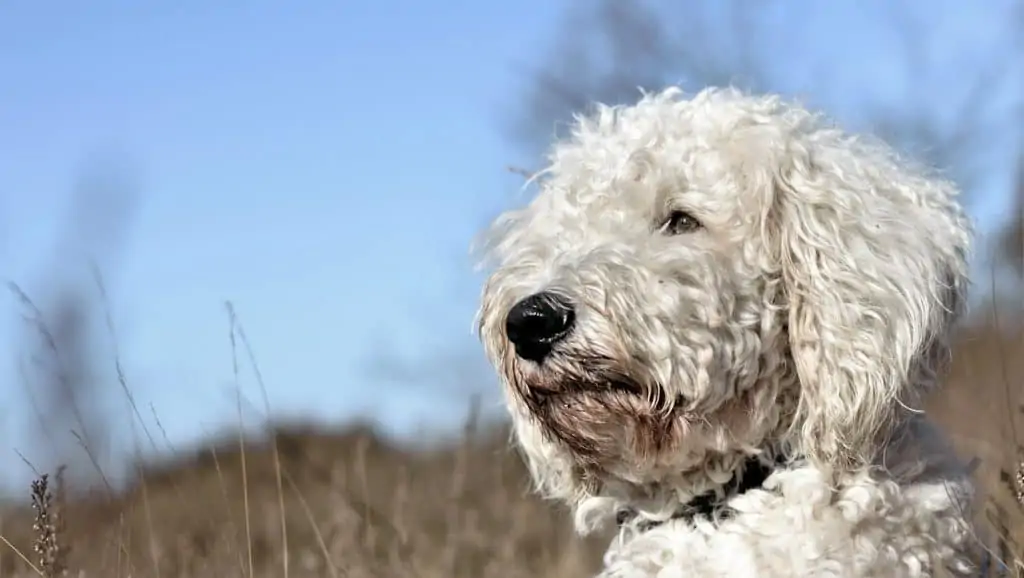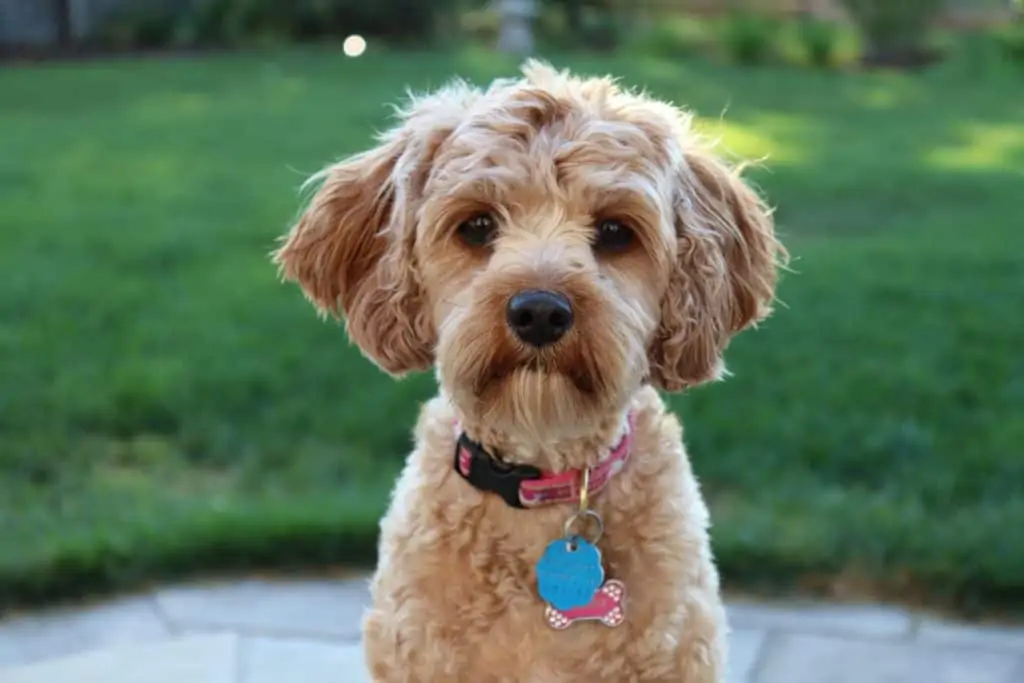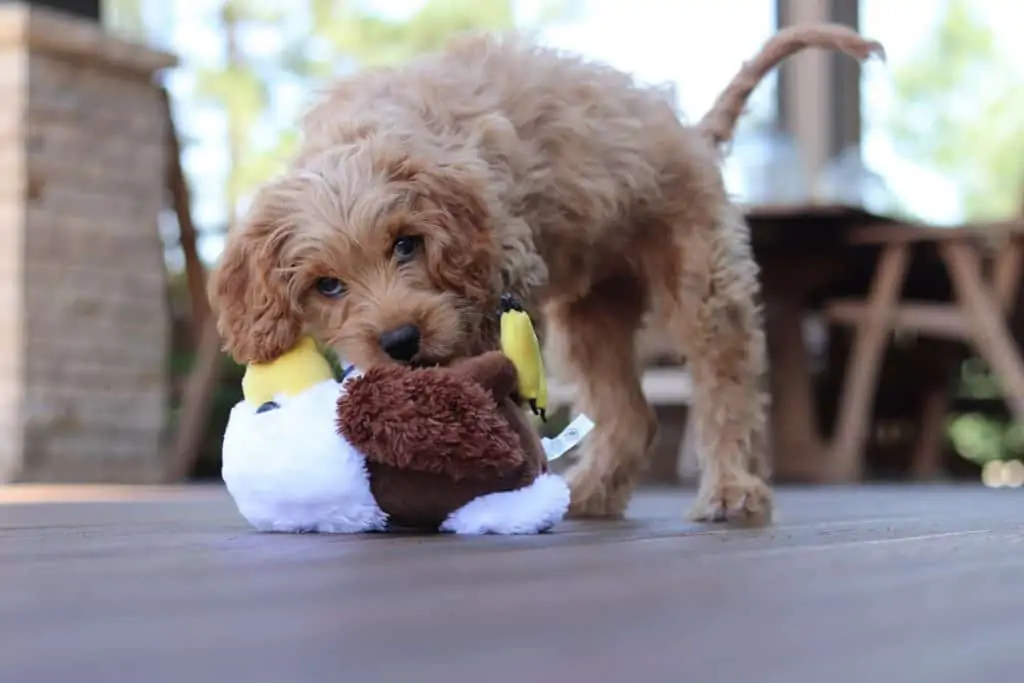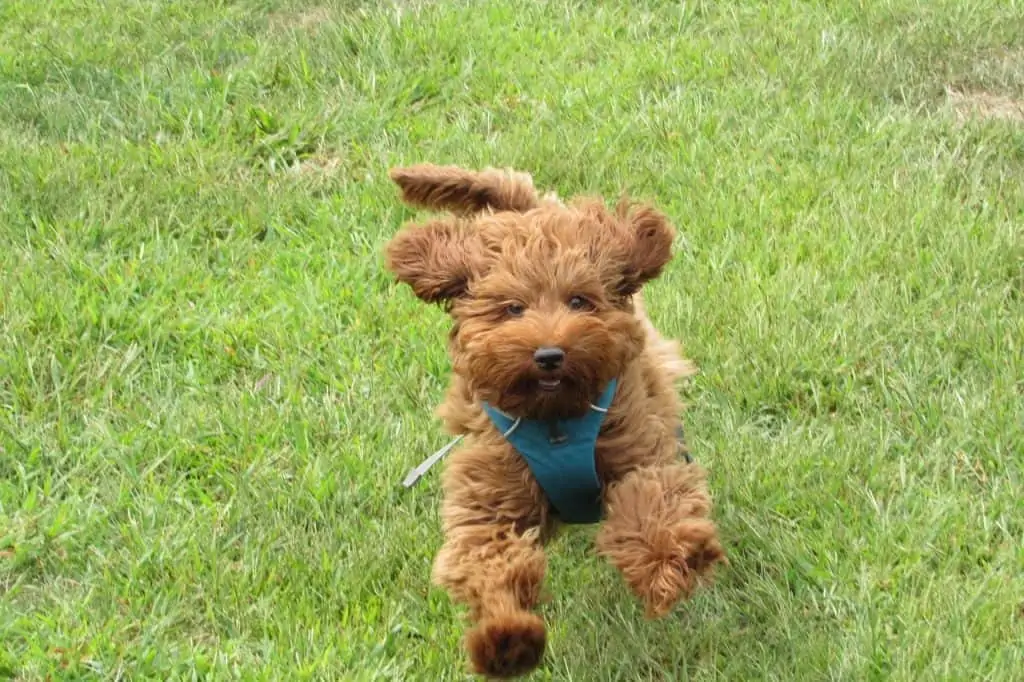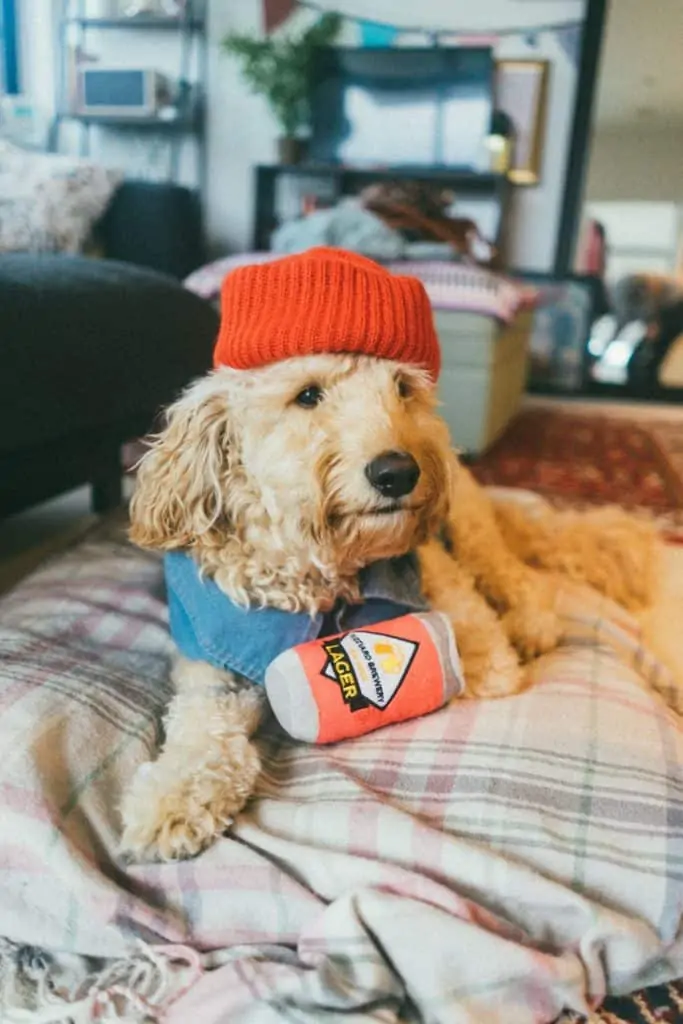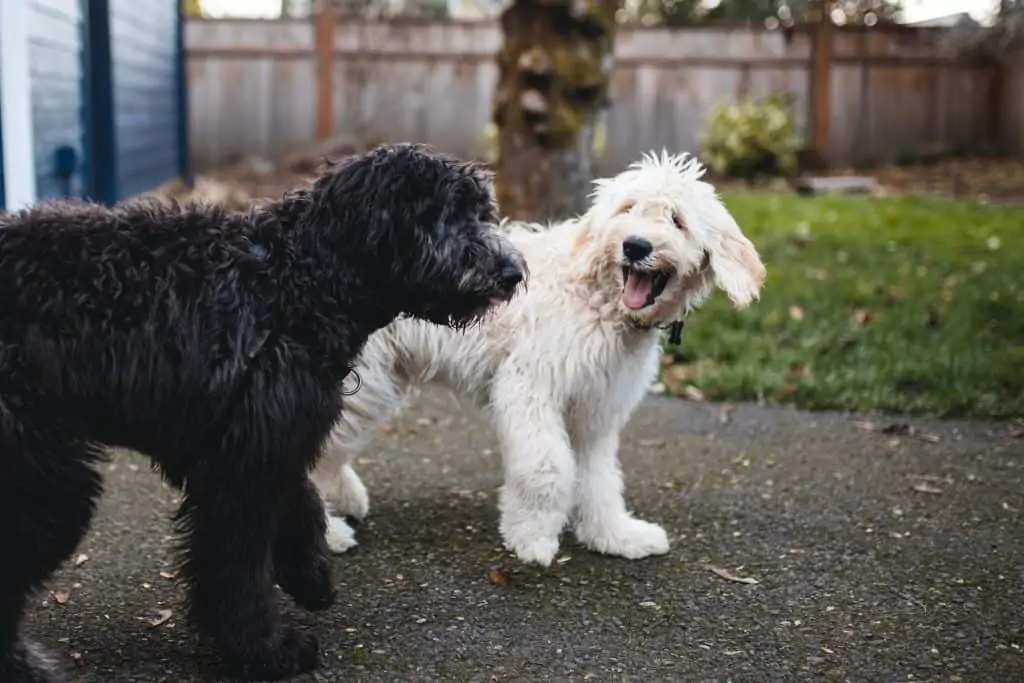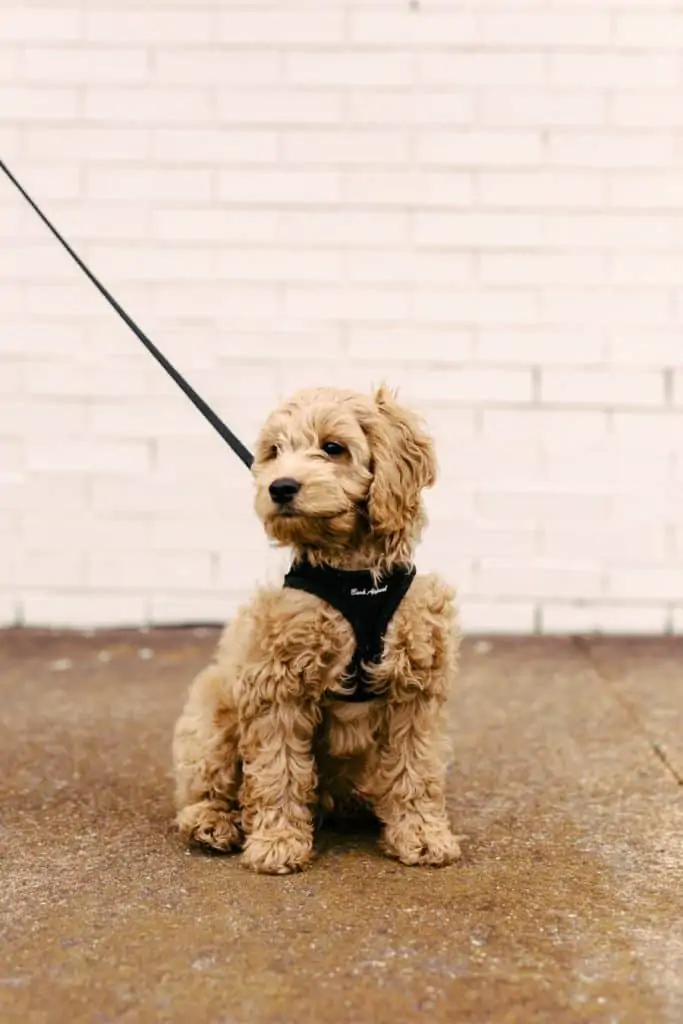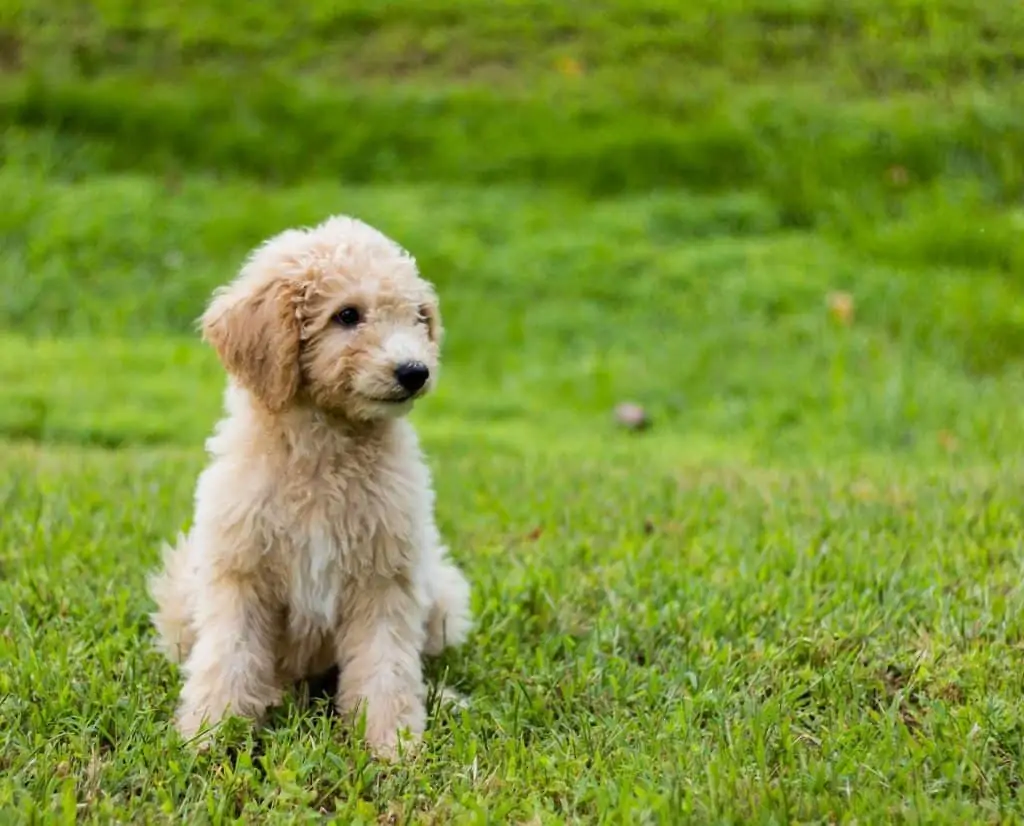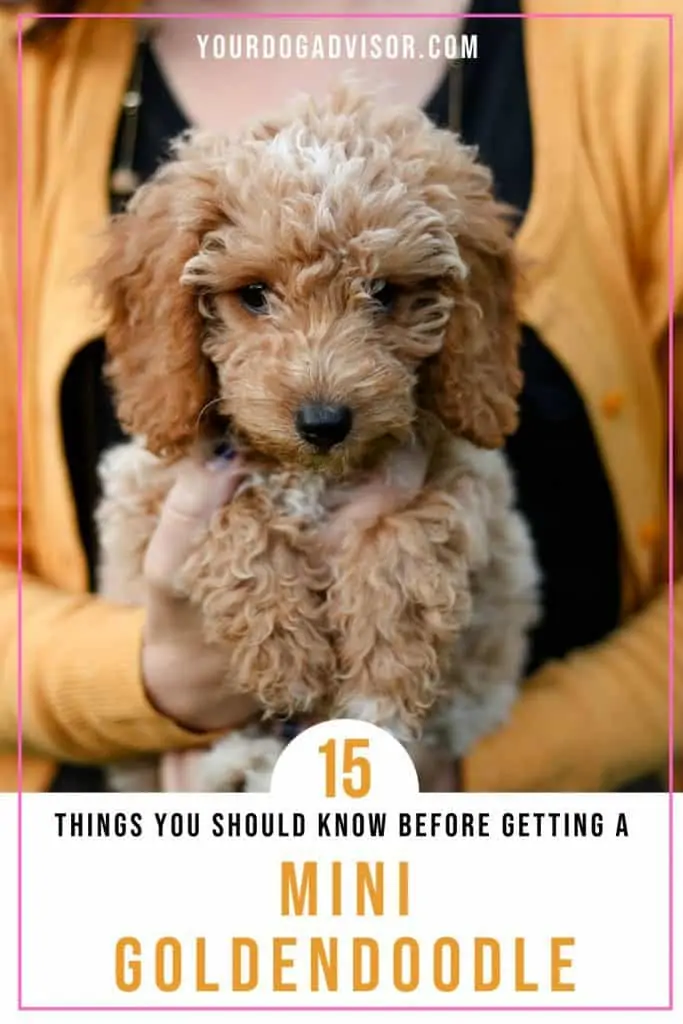The Goldendoodle is one of the most popular doodle dogs in the world, and the mini Goldendoodle is becoming just as coveted.
But is the mini Goldendoodle really as good as the standard Goldendoodle? And what do you need to know about potential health issues, temperament and training?
If you’re considering getting a mini Goldendoodle, you’ve come to the right place. Today’s article is going to cover everything you should know before investing in the miniature Goldendoodle dog.
Let’s begin.
Contents
1. The Mini Goldendoodle Is A Crossbreed, So There Is No Set Breed Standard
Mini Goldendoodles are a mix between the Golden Retriever and the Miniature Poodle.
The mini goldendoodle is a miniature version of the standard Goldendoodle and is a crossbreed. Also known as a hybrid, designer dog, or mixed breed dog, the mini Goldendoodle is the offspring of two different purebred parent breeds.
As such, there is no set standard for the Mini Goldendoodle. Still, there are some basic characteristics you can expect when it comes to the average mini Goldendoodle.
Take a look.
The Mini Goldendoodle Is A Cross Between: The Miniature Poodle and the Golden Retriever
Average Height: 13 – 20 Inches
Average Weight: 15 – 35 Pounds
Average Coat Type: Wavy, Hypoallergenic
Average Coat Color: Black, blue, silver, brown, sable, merle, parti, white, cream, red, apricot, and tan.
Average Life Span: 10 – 15 Years
Average Temperament: Friendly, Affectionate, Intelligent, Playful
Average Energy Level: Moderate
Average Exercise Needs: Moderate
Common Health Issues: Von willebrand’s Disease, Bloat, Hypothyroidism, Ear Infections, PRA, Hip Dysplasia, Elbow Dysplasia and Allergies
Clubs That Accept The Mini Goldendoodle Dog
Yes, the American Kennel Club (AKC) is on the above list of clubs that accept the Mini Goldendoodle. That said, the AKC does not recognize the Mini Goldendoodle or any Goldendoodle as a purebred just yet.
This means you will not be able to show your Mini Goldendoodle in competitions or dog shows. However, you can register your Mini Goldendoodle with the AKC, which comes with numerous benefits for pet parents and their dogs.
2. Mini Goldendoodles May Look Different Depending On Their Generation of Crossbreed
This mini Goldendoodle looks more like a Poodle, but others can look more like Golden Retrievers.
Because your Mini Goldendoodle is a crossbreed, his appearance can and will vary depending on the generation of crossbreed you get.
Originally, crossbreeding was used by breeders as a way to create a new purebred. In fact, most purebred dogs we know and love today are the result of generations of crossbreeding. However, it takes years of perfecting and refining to create a purebred dog, which is one of the reasons the Goldendoodle has yet to be considered a breed in it’s own right.
The mini Goldendoodle, and other hybrid dogs like him, are considered relatively new crossbreeds. Though they are being sold by breeders, they are still too new to have established a particular coat type, size, and appearance.
That said, and as you saw above, there is an average standard you can look to in order to predict what your mini Goldendoodle may look like.
Still, it’s important to keep in mind that a Mini Goldendoodle, who is a cross between a miniature Poodle and a Golden Retriever, is going to vary in appearance depending on his generation.
If you want a mini Goldendoodle with a specific look, we suggest going for a second or third generation crossbreed.
First generation crossbreeds are the most unpredictable as far as appearance because they are the direct offspring of two different parent breeds. Second or third generation crossbreeds are the offspring of two other crossbreed parents, which can help ensure their look.
If you want to ensure you get a dog with a particular look, you might also consider adopting an adult mini Goldendoodle that is over a year old. By this point, most dogs will have established their coat type and appearance, and you won’t be left with surprises down the road.
Of course, keep in mind that you’re investing in a dog, not a coat type or color. At the end of the day, your dog’s appearance is the least important aspect to be concerned about.
Most pressing should be health, temperament, and energy level.
3. The Mini Goldendoodle Loves Everyone and Everything
Mini Goldendoodles are very family friendly and playful.
When it comes to the temperament of the mini Goldendoodle, you’re not going to find a more winning temperament.
Goldendoodle dogs in general are affectionate, family-friendly and playful. This makes them excellent additions to homes with children and other pets, and for owners who are looking for a dog who will be a joy to live with.
Of course, this could also be problematic, especially if your Goldendoodle isn’t having his needs met. Highly intelligent and affectionate dogs like the mini Goldendoodle can also be more prone to temperamental issues like destructive behaviors, separation anxiety, bathroom accidents and barking.
In fact, though the mini Goldendoodle is a relatively quiet dog, he can be prone to whining, digging, chewing and scratching if left to his own devices.
With that in mind, the mini Goldendoodle will do best in a home with owners who have flexible schedules and can spend enough quality time with their dog. This is a family companion who is designed to be around his people and will thrive in a home where he is an active member of his pack.
If you have other pets in the home, your mini Goldendoodle will enjoy them as well. He gets along fabulously with other dogs and cats. That said, keep in mind that both the Poodle and the Golden Retriever were originally bred for water retrieving. As such, your mini Goldendoodle may have a high prey drive when it comes to smaller animals like rodents and birds.
Don’t leave your mini Goldendoodle unattended with much smaller pets.
We should also note that, while mini Goldendoodles do great with children, it’s still best to teach children how to appropriately behave around the family dog. Monitor very young children around your mini Goldendoodle to ensure everyone is getting along safely, and be sure to properly socialize your mini Goldendoodle at an early age to prevent behavioral issues.
4. The Mini Goldendoodle Is Considered Hypoallergenic and Is A Great Dog For Allergy Sufferers
These dogs are usually hypoallergenic, which means they shed very little and produce less allergy-inducing dander.
Do you suffer from allergies? Then you’ll be happy to learn that the mini Goldendoodle is considered hypoallergenic. Of course, there is a bit of misconception surrounding that word. In reality, no dog is truly hypoallergenic as all dogs do shed a bit.
However, when it comes to the mini Goldendoodle, he sheds much less than many other breeds or mixes and he produces much less allergy-inducing dander in his fur.
This is great news if you or someone in your home suffers from allergies to dogs and cats.
You can further help keep your mini Goldendoodle’s coat in ship shape and reduce shedding by ensuring your dog is on a quality diet, is routinely groomed, and receives bathing as needed.
5. The Mini Goldendoodle Has A Long Lifespan of 10-15 Years, But they Can Still Be Prone to Some Health Issues
Mini Goldendoodles are relatively healthy and long-lived hybrid dogs.
Have you ever heard of hybrid vigor? This is a term coined by supporters of crossbreeding who theorize that crossbreed dogs may be healthier than their purebred counterparts due to their widened gene pool.
While there is something to this idea and while most mini Goldendoodle dogs are long-lived and healthy, it’s still important to consider the health issues of this crossbreed.
In spite of his hybrid vigor, be aware that your mini Goldendoodle could be susceptible to any of the same health issues as his purebred parent breeds.
These health issues include but are not limited to:
- Von Willebrand’s Disease
- Prgressive Retinal Atrophy
- Patellar Luxation
- Bloat
- Hypothyroidism
- Hip Dysplasia
- Elbow Dysplasia
- Ear Infections
- And Allergies
All the above health issues can be serious and devastating to a Goldendoodle, but most can be screened for early on. You can also help reduce the chances of the above health issues in your Mini Goldendoodle by getting your puppy from a reputable breeder, keeping up with routine vet visits, and ensuring your Mini Goldendoodle eats a quality diet.
However, there is a health issue that could come on suddenly and unexpectedly in your mini Goldendoodle known as Gastric Dilatation-Volvulus (GDV), or Bloat. Bloat occurs when air fills the intestine, causing the stomach and other organs to flip.
Bloat is often caused by eating too quickly, over-eating, eating or drinking immediately after exercise or play, or eating something your dog shouldn’t. However, Bloat can also come on suddenly.
It’s important to know the risks and symptoms, and to have a plan for Bloat if you notice your mini Goldendoodle suffering from symptoms.
Symptoms include panting, excessive drooling, extended abdomen, unproductive vomiting, obvious distress, lethargy, and collapse.
If you notice signs of Bloat in your mini Goldendoodle, seek immediate medical care from a veterinary professional.
6. The Mini Goldendoodle Can Make A Good Dog For Apartment Living
Mini Goldendoodles are small and are better suited for apartment living than their standard Goldendoodle counterparts.
Standard sized Goldendoodles are not recommended for apartment living due to their larger size and high energy level. However, the mini Goldendoodle is an excellent alternative to owners looking for this hybrid dog to join their family in an apartment or smaller space.
Much more compact than their standard-sized counterparts and thus less energetic, the mini Goldendoodle does fabulously in apartments.
Of course, that doesn’t mean he won’t need routine exercise. Still, so long as his exercise and mental stimulation needs are met, the mini Goldendoodle is a wonderful and adaptable companion to homes of all sizes.
He does not necessarily need a backyard, though he will enjoy one. Mini Goldendoodles are also relatively quiet dogs, which is great for small-space living and for those of you with neighbors nearby.
If you’re renting, you should know that mini Goldendoodles can be prone to some destructive behaviors, especially if their needs are neglected. If left alone for too long, you may wind up with chewed furniture, bathroom accidents and more.
To avoid this, try not to leave your adult mini Goldendoodle alone for longer than five hours at a time, and consider crate training him while you are at work.
When done properly, crate training can help reduce anxiety and depression and help keep your Goldendoodle happy, healthy and well-rounded.
7. The Mini Goldendoodle Should Eat A Dog Food Specified For Smaller Breed Dogs
Mini Goldendoodles are smaller dogs with a higher metabolism.
We did mention above how important a quality diet is for your mini Goldendoodle, and for good reason.
Mini Goldendoodle dogs are smaller than their standard Goldendoodle counterpart, and thus they have a higher metabolism. As such, they are going to do best on a quality dog food specified for their age and weight.
Smaller dogs require more calories than large breed dogs in order to stay full and feel their best. They should also eat dog food that is rich in real meat protein, fatty acids, carbs, vitamins, minerals, and has a good source of water.
Avoid dog foods that include additives, fillers, soy, wheat, corn or animal byproducts, and instead choose quality brands you trust.
When in doubt, it’s a great idea to speak with your veterinarian about which foods are best for your specific dog.
8. There Are Three Types Of Mini Goldendoodle Available
English Goldendoodles are typically white in color.
Do you love options? Then you’ll be overjoyed to learn that there are actually three different types of mini Goldendoodle available. These types include the American Goldendoodle, the Australian Goldendoodle, and the English Goldendoodle.
The American Goldendoodle
The American Goldendoodle is the standard Goldendoodle most of us think of when we think of Goldendoodles. Bred in the United States by breeders hoping to create hypoallergenic service dogs, the American Goldendoodle is a family favorite.
He comes in several color combinations and is a cross between the purebred Poodle and purebred Golden Retriever.
The Australian Goldendoodle
Australian Goldendoodles are actually not a cross between the purebred Poodle and Golden Retriever mix. Instead, this is a mix between the English Goldendoodle and the Australian Labradoodle OR a mix between the English Cream Golden Retriever and Australian Labradoodle.
The English Goldendoodle
Mini English Goldendoodles are a mix between the English Cream Golden Retriever and the Mini Poodle. This combination often creates a lighter colored Goldendoodle dog that is white or cream colored, like in the image above.
Regardless of which version of mini Goldendoodle you get, you will be happy to learn that temperament and health are still relatively the same across the board.
9. A Mini Goldendoodle is A Good Dog For First Time Dog Owners
Mini Goldendoodles are easy to train and relatively low-maintenance, making them great dogs for first time owners.
If you don’t have much experience with dogs, then the mini Goldendoodle is a great first-time companion. These dogs are easy to groom, simple to train, and affectionate to boot. This means they will be friendly and outgoing and will make for a low-maintenance dog both inside and outside of the home.
Of course, all dogs require commitment and care, so even a low maintenance dog like the mini Goldendoodle will need an owner who is devoted and ready.
That said, the mini Goldendoodle is an ideal dog for first-time dog owners with flexible schedules, children in the home, and even other pets.
10. Training and Socializing A Mini Goldendoodle is a Breeze
Goldendoodle dogs are incredibly smart and easy to train.
While the mini Goldendoodle is a great dog for first time dog owners, and while he does get along with most anyone he meets, it’s important to socialize and train your Goldendoodle routinely.
Properly socializing your mini Goldendoodle will greatly reduce problematic behaviors like fear-based aggression, anxiety and stress.
To socialize your mini Goldendoodle, try and introduce him to as many new people, places, sights, sounds and experiences as you can at an early age. Work to make these first impressions positive for your Goldendoodle to help reduce fear-based behavioral issues, and get him used to being physically handled by children, men and women.
Along with socializing your mini Goldendoodle, it’s also best to begin training him right away. It’s never too early to work on training a dog and when it comes to the mini Goldendoodle, training is a breeze!
This is a crossbreed that will enjoy learning. He is eager to please and incredibly smart, so training will be fun and quick.
The mini Goldendoodle will do best with positive reinforcement training techniques like treats and praise as opposed to punishments. Refrain from punishing or scolding your mini Goldendoodle, as this could lead to your mini Goldendoodle shutting down.
11. Mini Goldendoodles Will Need Routine Exercise
Mini Goldendoodles may be smaller, but they still require daily exercise.
Though smaller than standard sized Goldendoodle dogs, the mini Goldendoodle is still a hybrid that comes from two athletic and energetic parent breeds. As such, the mini Goldendoodle will do best with routine exercise each and every day to stay happy and healthy.
Experts recommend that the mini Goldendoodle gets at least 30 to 60 minutes of exercise a day and plenty of playtime in between. Your mini Goldendoodle will enjoy numerous exercise activities like swimming, running, jogging, and dog park activities or playdates with other dogs.
Along with routine exercise, a mini Goldendoodle will also need plenty of mental stimulation. Because this breed is so intelligent, he will appreciate playing with puzzle toys that challenge him and keep him engaged.
He will also do well when given chores to do around the house. In fact, many people find that their mini Goldendoodle is an excellent help when it comes to sorting laundry, loading the dishwasher or even carrying in the mail.
Remember, Goldendoodles were bred service dogs, so the more they feel they are helping you the happier they will be.
12. The Mini Goldendoodle Is Not A Great Watchdog
Mini Goldendoodles are friendly and affectionate, so they don’t make the best guard dogs.
If you’re looking for a watchdog to guard your home, don’t look for a Goldendoodle. Mini Goldendoodle dogs are friendly by nature and know no strangers. They are much more likely to greet an intruder with a wagging tail than to bark or snarl.
Of course, this is great news for those who want a quiet, friendly and happy-go-lucky dog.
The good news is that experts have found most intruders will avoid homes with dogs in general, so even if your mini Goldendoodle isn’t a great watchdog, his very presence may still sway ill-intentioned people.
13. Mini Goldendoodles Are Super Easy To Groom
Because of their hypoallergenic coats, mini goldendoodle dogs are easy to groom and maintain.
Because mini Goldendoodles are hypoallergenic, their coats are often easier to maintain. The exception to this rule is if you allow your mini Goldendoodle to grow his coat out longer. Though they do shed less than many other dogs, they can be prone to matting and skin issues if they are not properly cared for.
Mini Goldendoodles should be groomed and brushed a few times a week with a dematting comb designed to remove tangles and mats. They should also be bathed once every three weeks or so using a dog-safe shampoo and conditioner.
Try not to overbathe your mini Goldendoodle as doing so could throw off his PH levels and lead to skin problems, dry spots and patchy fur.
Along with routine bathing and brushing, your mini Goldendoodle should have his ears cleaned and checked regularly to keep them free of buildup and reduce the chances of ear infections. He will also need his nails trimmed often to keep them from cracking or splitting during play and exercise.
14. Your Mini Goldendoodle Will Follow You Everywhere
Mini Goldendoodles become very bonded with their people.
Mini Goldendoodle dogs are like little furry shadows. They become very bonded with their family and want to be in the middle of all the action. For this reason, it’s not uncommon for mini Goldendoodles to follow their people from room to room.
Unfortunately, this can also mean that your mini Goldendoodle is prone to suffering from separation anxiety. In order to help your mini Goldendoodle cope with being alone when you leave, try committing to a schedule.
Most dogs do much better when they know what to expect. Dogs also have a surprisingly good sense of time and will be able to predict when you’re going to leave and when you’re going to return.
It might also be a good idea to have special toys set aside and designated for when you leave. Toys like KONGS or puzzle toys that utilize treats can help keep your mini Goldendoodle engaged and distracted while you’re gone, which can further help to reduce problematic or destructive behaviors.
By creating a routine and providing things for your mini Goldendoodle to do while you’re gone, you will help them accept being alone which can help them associate you leaving with a pleasant experience as opposed to a negative one.
15. Mini Goldendoodle Puppies Can Be More Expensive Than Standard Goldendoodle Puppies
Mini Goldendoodle puppies are often very expensive.
Coming across a mini Goldendoodle can be more difficult than finding a standard sized Goldendoodle. This is because mini Goldendoodles usually take a few generations to perfect in order to ensure they are smaller than their standard counterparts.
For this reason, going through a breeder may cost you a pretty penny. On average, mini Goldendoodle puppies cost between $1,500 and $3,500. This price can vary depending on the breeder you go through, the quality of your mini Goldendoodle’s parent dogs, and which of the three versions of Goldendoodle you’re looking for.
Although mini Goldendoodles are pricey, it’s important not to cut corners when going through a breeder. Beware of backyard breeders or unqualified online sellers promising mini Goldendoodle puppies for a bargain price.
You are much more likely to wind up with a sick puppy if you go this route, and this will cost you more money in the long run.
Instead, go through breeders who are certified and understand the importance of responsible breeding practices. Many qualified breeders will also be able to provide you with certificates of health.
Another option you have when looking for a mini Goldendoodle is to go through a rescue that specializes in Goldendoodles or doodle dog mixes. Rescues usually charge a fraction of the price that breeders charge and you may even be able to get a free initial vet exam.
Whichever route you choose to take when it comes to getting your mini Goldendoodle, just be sure to do plenty of research and take your time. Remember, investing in a mini Goldendoodle requires a long-term commitment.
Luckily, you’ll be investing in your new best friend and all the ups and downs are sure to be worth it.
Enjoy the ride and thanks for reading!


Jen Jones is a professional dog trainer and behavior specialist with more than 25 years of experience. As the founder of ‘Your Dog Advisor’ and the ‘Canine Connection’ rehabilitation center, she applies a holistic, empathetic approach, aiming to address root causes rather than merely treating symptoms.
Well known for her intuitive and compassionate approach, Jen adopts scientifically-proven, reward-based methods, encouraging positive reinforcement over punishment. Jen specializes in obedience training, behavior modification, and puppy socialization. Her innovative methods, particularly in addressing anxiety and aggression issues, have been widely recognized. Jen has worked with many of the world’s leading dog behaviorists and in her free time volunteers with local animal shelters and rescue groups.
